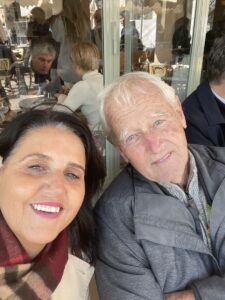
Adoptee Story: Alexandra Birrell
Adoptee Story:
Alexandra, born in Canada, adopted in Canada.
INTRO: Fellow adoptee Alexandra shares with us, her adoptee story, in her own words. She tells us the story that lead up to her being adopted and goes on to tie together her mother’s story with her own years later…

Kellie was a classic teen beauty with luscious, wavy hair and voluminous lips that she often painted with lipstick. At fourteen, she was mature for her age and radiated a sense of independence. She was a warm, loving girl, heavily influenced by her grandparents’ family values. Her sensitivity gave her a knowing depth — she could often see what others couldn’t — and her friends often turned to her as a source of trust and dependability.
Being the friend that everyone trusted was difficult at times. On one occasion, Kellie went with a friend to a shady, back-alley clinic to support her through an abortion. The doctor’s status was questionable.
Haunted by memories of the pain her friend had gone through, she began to have nightmares. At the same time, her relationship with her childhood sweetheart was put on pause. Already feeling isolated, she was thrown into agonising grief when her grandfather passed away suddenly.
Disenchanted with the world around her, Kellie decided to drop out of school and work to earn her own money. During this difficult time, Kellie ended up with an older boy.
Her new boyfriend was insecure, spiteful and verbally abused her. Kellie was not surprised by his reaction when she told him she thought she was pregnant by him: her faith guided her to turn down his suggestion of an abortion; he hit her in her face. Kellie told him to get out and did not see him again for three years. He never asked about what she had done about the pregnancy, and she never told him.
Fifteen years old, a child herself, she was scarred by her experience of abortions, yet she knew what a difficult life she and her baby would have together. Kellie dug deep and made the most compassionate decision she could think of — she decided to go through with the pregnancy and give her baby to a couple who badly wanted a family. She had full faith that she would meet her child again and get the opportunity to explain herself and express her love.
Kellie kept her head down and did what she had to do. Steadfast in her decision, she didn’t know what her family would say and didn’t give anyone the opportunity to try to change her mind. She kept her pregnancy a secret for nine months by wearing baggy t-shirts. She denied her pregnancy to her parents until one day, she went into labour and they rushed her to the hospital.
Six hours later, Kellie’s daughter was born
Maria, she named her.
But Kellie had toxemia, dangerous for both mother and baby. Kellie held her daughter once before she was taken away and spent several days in the n hospital receiving blood transfusions. She was in a deep fog, just trying to survive.
It was at this time, in Kellie’s fragile state, that the social workers came to speak to her. In the notes that would one day tell her daughter who she was, they described her as a defeated young girl, senseless and unfeeling; blasé about giving her baby away.
By the time Kellie had recovered, her baby was long gone, swooped up by adoptive parents who were exhilarated and astonished to be suddenly thrust into their longstanding dream for a family of their own.
Supported by her parents, Kellie left the hospital motivated to go back to school and do the things she wouldn’t have otherwise been able to do. She used poetry and her connection to words to help her express the incredible journey she had been on, now at the tender age of 16.
~
That baby was me. I was born on 26th August, 1991 at 3:30 PM. I would have been born expecting skin to skin contact with my mother, the only home I had ever known.
At the time, newborn babies were thought to be La tabla rasa, a blank slate — ideal for putting up for adoption as it was thought that they had not known their mother. It is now understood that bonding begins in the womb, and even several months after birth, mother and baby are considered to remain a “single psychobiological organism” (Phillips, 2013).
I was a ‘colicky’ baby — a baby that cries constantly for no apparent reason. Looking back with some understanding of the science, I see with compassion a newborn baby who did not have the capacity to understand that she had a new mother who was not the mother who carried her. My name was changed, and as I grew into a toddler, I was given the narrative that I was adopted because I was chosen; I was special.
I was a ‘colicky’ baby — a baby that cries constantly for no apparent reason. Looking back with some understanding of the science, I see with compassion a newborn baby who did not have the capacity to understand that she had a new mother who was not the mother who carried her. My name was changed, and as I grew into a toddler, I was given the narrative that I was adopted because I was chosen; I was special.
I remember the moment I understood that I was chosen only because I had been given away. “I’m adopted,” I parroted, at the age of five on the playground, “that means I’m special!” I beamed. “But where’s your real mummy?” came the response, and the shock felt like it shattered the earth beneath me. I’d never thought of that — where was she?
I have dreamt about my biological mother ever since I can remember. In the first grade, my teacher read us “Are you my mother?” by Dr. Suess. In the book, a hatchling bird loses its mother and walks around asking all the animals it sees, “Are you my mother?” I knew just how that little bird felt — always searching for a familiar face, wondering if my mother would recognise me if she saw me.
Every year when my birthday would roll around, despite being surrounded by people who loved me, I would feel incredibly alone. Little did I know that my mother was feeling the same longing, the same loss, on the same day, thirty minutes away on the other side of town.
As I grew up, I became a warm and loving teen, with family values learned from my grandparents, with sensitivity and depth. I had a big, open and soft heart that made my friends turn to me in times of trouble. I was mature for my age, with an independent spirit. But under the surface, there was deep pain. Normal losses that teenagers go through, such as the endings of relationships or friendships, threw me into despair. I had a deep-seated belief that I was worthy of abandonment — after all, my story was that my own mother had not wanted me. I did not trust anyone in my life. My boundaries were weak; I learned to use my sexuality to gain apparent acceptance from my peers. More than most teens, I was desperately searching for belonging.
As a young adult, after several relationships had gone south due to my deeply embedded trust issues, I was in Barcelona staring at a full moon. I was tired of running, tired of never feeling good enough, tired of not knowing who I was, or where I belonged. For the first time in my life, I looked to the sky and I prayed, “I’m willing to do whatever work it takes, please just help me find what I’m missing.”
I remember the moment I understood that I was chosen only because I had been given away. “I’m adopted,” I parroted, at the age of five on the playground, “that means I’m special!” I beamed. “But where’s your real mummy?” came the response, and the shock felt like it shattered the earth beneath me. I’d never thought of that — where was she?
I have dreamt about my biological mother ever since I can remember. In the first grade, my teacher read us “Are you my mother?” by Dr. Suess. In the book, a hatchling bird loses its mother and walks around asking all the animals it sees, “Are you my mother?” I knew just how that little bird felt — always searching for a familiar face, wondering if my mother would recognise me if she saw me.
Every year when my birthday would roll around, despite being surrounded by people who loved me, I would feel incredibly alone. Little did I know that my mother was feeling the same longing, the same loss, on the same day, thirty minutes away on the other side of town.
As I grew up, I became a warm and loving teen, with family values learned from my grandparents, with sensitivity and depth. I had a big, open and soft heart that made my friends turn to me in times of trouble. I was mature for my age, with an independent spirit. But under the surface, there was deep pain. Normal losses that teenagers go through, such as the endings of relationships or friendships, threw me into despair. I had a deep-seated belief that I was worthy of abandonment — after all, my story was that my own mother had not wanted me. I did not trust anyone in my life. My boundaries were weak; I learned to use my sexuality to gain apparent acceptance from my peers. More than most teens, I was desperately searching for belonging.
As a young adult, after several relationships had gone south due to my deeply embedded trust issues, I was in Barcelona staring at a full moon. I was tired of running, tired of never feeling good enough, tired of not knowing who I was, or where I belonged. For the first time in my life, I looked to the sky and I prayed, “I’m willing to do whatever work it takes, please just help me find what I’m missing.”
My mother had also been deeply reflecting on the other side of the world. She was not happy with her path in life — despite her successful career, she wanted her life to be deeply aligned with her heart and her passion. One stressful day, she walked out of her office in Montreal and stumbled across a statue of a young mother holding a baby. She thought of me. She knew that I had recently turned 18, and believed that I would be reaching out soon. It was a catalyst for quitting her job and starting her own business that centred around her faith, which was a cornerstone of her life that supported her in all of our years apart.
I thought of my mother constantly and knew that I was ready to meet her, but I was paralysed by fear. I felt connected to my adoptive parents; they were the only family I had ever known. I had a lifetime of beautiful family memories with them. They were the ones who had raised me and were there for me. They were, and still are, my mum and dad — I felt this deeply and completely. But my feelings about adoption were not something that we discussed openly.
My feelings, kept secret for so long, became more and more toxic as the years went by. I tried to push them down, but an obesity of grief sat on my chest, day in and day out. Finally, my partner told my parents what was going on. They understood, and immediately sent me my adoption files with all of the information I needed to find my mother. I sent them to a group who specialised in tracking down biological families. Just two days later, I received the LinkedIn profile of a young woman, and was told she was my biological aunt. I had no idea if she even knew that I had been born.
At 25 years old, with shock and disbelief, I typed out the strangest, most deliberately vague message I have ever sent:
“Hello, I am looking for your sister Kellie. She knew me back in the early 90’s in Scarborough, Ontario. We haven’t seen each other for a very long time. In fact, one could say, a lifetime.
She may know me as Maria.”
References
Phillips, R. (2013, July 18). Uninterrupted Skin-to-Skin Contact Immediately After Birth. Retrieved HERE.
Video of the moment I met my mother HERE.
Alexandra is currently studying TCTSY (yoga for trauma) which is a specific practice designed to help people who have experienced relational trauma find home within their bodies. She will (hopefully!) be qualifying in March and will be offering classes specifically for adoptees. The best place to reach Alexandra and connect with her is on her INSTAGRAM.
Amanda Medina
About Us
This Adoptee Life is where adoptees can explore their story, share their experience, and speak their truth, in support and community with fellow adoptees, and the world.

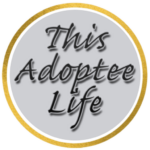


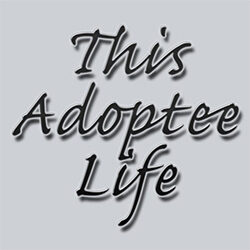
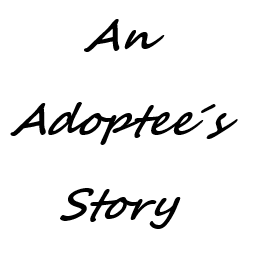
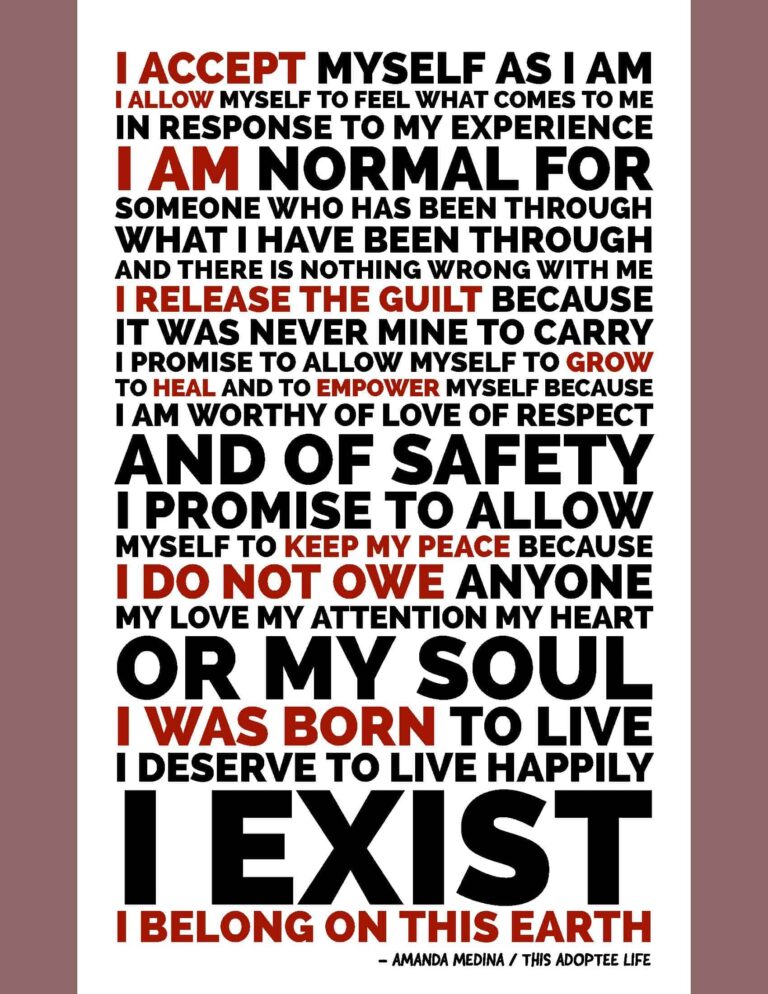
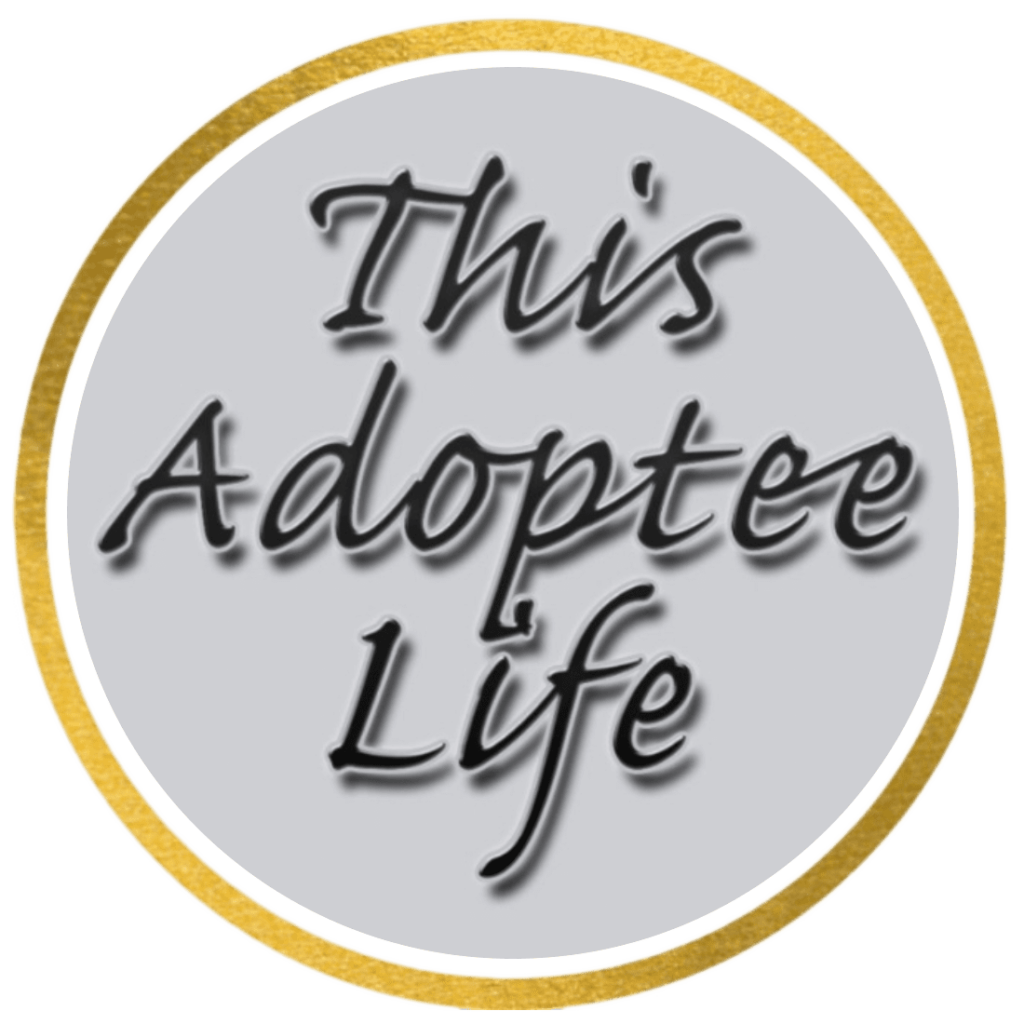
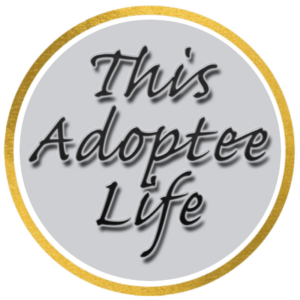
1 thought on “Adoptee Story: Alexandra Birrell”
Wow!